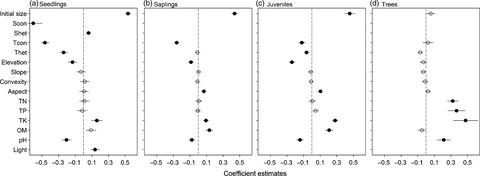Our official English website, www.x-mol.net, welcomes your feedback! (Note: you will need to create a separate account there.)
Abiotic niche partitioning and negative density dependence across multiple life stages in a temperate forest in northeastern China
Journal of Ecology ( IF 5.5 ) Pub Date : 2019-11-29 , DOI: 10.1111/1365-2745.13335 Jie Yao 1 , Benedicte Bachelot 2 , Lingjun Meng 1 , Jianghuan Qin 1 , Xiuhai Zhao 1 , Chunyu Zhang 1
更新日期:2019-11-29
Journal of Ecology ( IF 5.5 ) Pub Date : 2019-11-29 , DOI: 10.1111/1365-2745.13335 Jie Yao 1 , Benedicte Bachelot 2 , Lingjun Meng 1 , Jianghuan Qin 1 , Xiuhai Zhao 1 , Chunyu Zhang 1
Affiliation

|
- Negative density dependence (NDD) and niche partitioning have been proposed to explain the species coexistence in plant communities. However, the majority of previous studies have examined either only resource partitioning or NDD, or have focused only on a single life‐history stage. We thus lack knowledge regarding the relative importance of biotic neighbourhood interactions and abiotic conditions on survival at the various life stages of a tree.
- Using tree and seedling demographics data, and combined with spatially explicit abiotic and biotic data, we assessed the relative importance of abiotic and biotic variables for survival from the seedling to tree stage in a temperate forest in northeastern China.
- We provide strong evidence that both biotic and abiotic neighbourhood variables affect individual survival. We also observed that their relative importance varied with the life‐history stages of a tree. The strength of the effect of conspecific tree neighbours decreases along ontogeny, while the roles of the topographic and edaphic variables increase at later life stages. Heterospecific tree neighbours show consistent negative effects on individual survival at all life stages, yet had the strongest influence on survival at the seedling stage.
- We demonstrated that species vary widely in their probability of survival under different environmental conditions, as well as in response to differences in neighbour identity and density. Overall, the effects of conspecific neighbours varied more among species than the effects of heterospecific neighbour density. Wide variation among species in response to abiotic variables is a necessary requirement for niche differentiation and coexistence via resource partitioning processes. Our findings indicate that conspecific NDD and abiotic niche partitioning are major structuring mechanisms in our temperate forest in northeastern China.
- Synthesis . Both biotic and abiotic neighbourhood variables affected individual survival, but the relative importance varied with the life‐history stages and among species. Our results indicated that niche partitioning may contribute to the coexistence through differential responses to abiotic factors, as well as to conspecific negative density dependence (NDD). Finally, our results demonstrated the necessity to incorporate multiple life stages and multiple influence factors when elucidating the maintenance of species diversity in temperate forests.



























 京公网安备 11010802027423号
京公网安备 11010802027423号